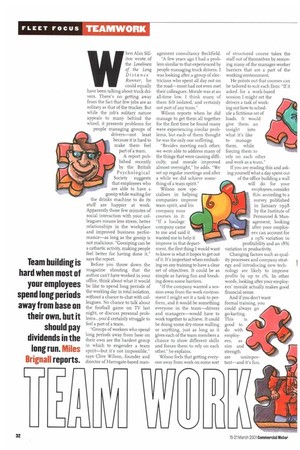illf hen Alan Sill
Page 34

If you've noticed an error in this article please click here to report it so we can fix it.
itoe wrote of the Loneliness of the Long Distance Runner, he could equally
have been talking about truck drivers. There's no getting away from the fact that few jobs are as solitary as that of the trucker. But while the job's solitary nature appeals to many behind the wheel, it presents problems for people managing groups of drivers—not least because it is hard to make them feel part of a team.
A report published recently by the British Psychological Society suggests that employees who are able to have a gossip while waiting for the drinks machine to do its stuff are happier at work. Apparently those few minutes of social interaction with your colleagues means less stress, better relationships in the workplace and improved business performance—as long as the gossip is not malicious. "Gossiping can be a cathartic activity, making people feel better for having done it," says the report.
Before you throw down the magazine shouting that the author can't have worked in your office, think about what it would be like to spend long periods of the working day in total isolation, without a chance to chat with colleagues. No chance to talk about the football game on TV last night, or discuss personal problems...you'd certainly struggle to feel a part of a team.
"Groups of workers who spend long periods away from base on their own are the hardest group in which to engender a team spirit—but it's not impossible," says Clive Wilson, founder and director of Harrogate-based man
agement consultancy Beckfield.
"A few years ago I had a problem similar to that experienced by people managing truck drivers. I was looking after a group of electricians who spent all day out on the road—most had not even met their colleagues. Morale was at an all-time low. I think many of them felt isolated, and certainly not part of any team."
Wilson reports when he did manage to get them all together for the first time he found many were experiencing similar problems, but each of them thought he was the only one suffering.
"Besides meeting each other, we were able to address many of the things that were causing difficulty, and morale improved almost overnight," he adds. "We set up regular meetings and after a while we did achieve something of a team spirit."
Wilson now specialises in helping companies improve team spirit, and his company runs courses in it: "If a haulage company came to me and said it wanted me to help it improve in that department, the first thing I would want to know is what it hopes to get out of it. It's important when embarking on any training to have a clear set of objectives. It could be as simple as having fun and breaking down some barriers.
"If the company wanted a session away from the work environment I might set it a task to perform, and it would be something everyone in the team—drivers and managers—would have to work together to achieve. It could be doing some dry-stone walling or anything, just as long as it gives each of the team members a chance to show different skills and forces them to rely on each other," he explains.
Wilson feels that getting everyone away from work on some sort of structured course takes the staff out of themselves by removing many of the manager-worker barriers that are a part of the working environment
He points out that courses can be tailored to suit each firm: "If it asked for a work-based session I might set the drivers a task of work ing out how to schedule a fictitious set of loads. It would give them an
insight into what it's like to manage them, while forcing them to rely on each other and work as a team."
If you are reading this and asking yourself what a day spent out of the office building a wall will do for your employees, consider this: according to a survey published in January 1998 by the Institute of Personnel & Man agement, looking after your employees can account for a 19% variation in profitability and an 18% variation in productivity Changing factors such as quality processes and company strategy and introducing new technology are likely to improve profits by up to 1%. In other words, looking after your employees' morale actually makes good financial sense.
And if you don't want formal training, you could always go go-karting.
This is good to do with employees, as size and stren
are unimportant—and it's fun.












































































































